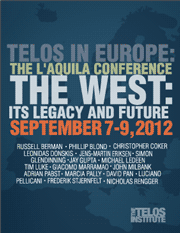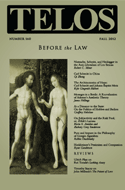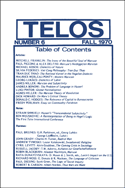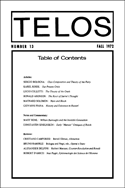By Ruth Starkman · Thursday, September 20, 2012 Jens-Martin Eriksen and Frederik Stjernfelt’s The Democratic Contradictions of Multiculturalism, published by Telos Press, is available for purchase here. The following interview with the authors appeared on the Huffington Post.
There is a moment in Jens-Martin Eriksen and Frederik Stjernfelt’s The Democratic Contradictions of Multiculturalism, when an Indian-Malaysian interview subject leans toward Eriksen and entreats him to describe the Malaysian multiculturalism as an “apartheid.” He invokes the infamous example of the erstwhile South Africa to underscore the distinct disadvantage his family experiences as a religious and ethnic minority in their native county with its “hard” form of multiculturalism. This provocative claim raises many questions about how multiculturalism is experienced in different contexts around the world.
Continue reading →
By Telos Press · Wednesday, September 19, 2012 Jens-Martin Eriksen, co-author (with Frederik Stjernfelt) of The Democratic Contradictions of Multiculturalism, recently appeared on The Agenda with Steve Paikin to discuss the rise of hatred in Western nations. Watch the video after the break.
Continue reading →
By Ruth Starkman · Tuesday, September 18, 2012 Ruth Starkman’s report on the recent Telos in Europe conference appeared in the Huffington Post.
 An uncannily warm light fills L’Aquila’s 13th century Basilica Santa Maria di Collemaggio. As one approaches the altar, it becomes clear the illumination falls in from the open sky. The roof and dome collapsed in L’Aquila’s catastrophic 2009 6.3 earthquake. While the church is still undergoing repair, much of the edifice appears intact, newly reinforced by concrete and already restored in many parts. In fact, it attests to the continued vitality of this ancient European city as it slowly rebuilds amid various economic, legal and bureaucratic struggles. An uncannily warm light fills L’Aquila’s 13th century Basilica Santa Maria di Collemaggio. As one approaches the altar, it becomes clear the illumination falls in from the open sky. The roof and dome collapsed in L’Aquila’s catastrophic 2009 6.3 earthquake. While the church is still undergoing repair, much of the edifice appears intact, newly reinforced by concrete and already restored in many parts. In fact, it attests to the continued vitality of this ancient European city as it slowly rebuilds amid various economic, legal and bureaucratic struggles.
L’Aquila and its historic buildings offer a unique place to debate the problems of Europe and the West, as the latter have also endured their share of continuing crises and efforts to rebuild. From Sept 7-10, 2012, some 50 philosophers, historians, literature scholars, social theorists, European Parliament members gathered to debate the fate of “The West: Its Legacy and Future” in the inaugural conference in L’Aquila hosted by the Telos Institute and the independent publisher Telos Press, which publishes the eponymous journal of politics and thought.
Continue reading →
By Russell A. Berman · Monday, September 17, 2012 Telos 160 (Fall 2012) is now available for purchase here.
 The Supreme Court decision on the Patient Protection and Affordable Care Act, the Obama administration’s signature legislation on health care, attracted exceptional public attention, and rightly so. Health is a vital concern, and the topic is charged with acerbic party politics. More importantly, the terms of the debate give evidence of a widespread awareness, across the political spectrum, that the case has raised questions about the scope of government power and the permissible reach of legislation. If there is one point on which opponents have agreed, it is this recognition of the core importance of the outcome for defining the relationship of the state to society. Both proponents of cradle-to-grave government care and advocates of a strictly limited state power (whether in individualist, free-market, or communitarian modes) recognize that the health-care outcome could be a decisive moment in the evolution of American society. The Supreme Court decision on the Patient Protection and Affordable Care Act, the Obama administration’s signature legislation on health care, attracted exceptional public attention, and rightly so. Health is a vital concern, and the topic is charged with acerbic party politics. More importantly, the terms of the debate give evidence of a widespread awareness, across the political spectrum, that the case has raised questions about the scope of government power and the permissible reach of legislation. If there is one point on which opponents have agreed, it is this recognition of the core importance of the outcome for defining the relationship of the state to society. Both proponents of cradle-to-grave government care and advocates of a strictly limited state power (whether in individualist, free-market, or communitarian modes) recognize that the health-care outcome could be a decisive moment in the evolution of American society.
Continue reading →
By James Santucci · Tuesday, September 4, 2012 As an occasional feature on TELOSscope, we highlight a past Telos article whose critical insights continue to illuminate our thinking and challenge our assumptions. Today, James Santucci looks at Fredy Perlman’s “Essay on Commodity Fetishism” from Telos 6 (Fall 1970).
 Two interesting things happened in the brouhaha over the proper antecedent of “that” in “You didn’t build that.” First, Dylan Matthews, a senior at Harvard who writes for Ezra Klein’s Wonkblog, explained several different theories of dessert and how each interpretation would inform the intent behind President Obama’s phrase. Soon afterward, Rush Limbaugh attempted to discredit Matthews’s and the Obama campaign’s defenses of the statement by accusing them of working with words. Never mind that they were accused of working with words; what we’re interested in is the suggestion that there is a fundamental antithesis between working with words and materially engaging with the world. Without meaning to do so, the two provided a perfect context for reading Fredy Perlman’s “Essay on Commodity Fetishism.” A close reading of the essay reveals that not only is there no antithesis, but also that because of the theory of the commodity fetish, Marxism is material engagement with real phenomena. Two interesting things happened in the brouhaha over the proper antecedent of “that” in “You didn’t build that.” First, Dylan Matthews, a senior at Harvard who writes for Ezra Klein’s Wonkblog, explained several different theories of dessert and how each interpretation would inform the intent behind President Obama’s phrase. Soon afterward, Rush Limbaugh attempted to discredit Matthews’s and the Obama campaign’s defenses of the statement by accusing them of working with words. Never mind that they were accused of working with words; what we’re interested in is the suggestion that there is a fundamental antithesis between working with words and materially engaging with the world. Without meaning to do so, the two provided a perfect context for reading Fredy Perlman’s “Essay on Commodity Fetishism.” A close reading of the essay reveals that not only is there no antithesis, but also that because of the theory of the commodity fetish, Marxism is material engagement with real phenomena.
Continue reading →
By Damien Booth · Monday, August 27, 2012 As an occasional feature on TELOSscope, we highlight a past Telos article whose critical insights continue to illuminate our thinking and challenge our assumptions. Today, Damien Booth looks at Giovanni Piana’s “History and Existence in Husserl’s Manuscripts” from Telos 13 (Fall 1972).
 In Giovanni Piana’s “History and Existence in Husserl’s Manuscripts,” we get a presentation of Edmund Husserl’s thought regarding the “problem of others” and external-world skepticism in various manuscripts written in Husserl’s later period. The inclusion of the thought contained within these manuscripts serves to give us deeper access to the problem of others and the way Husserl approaches the problem in his later works. Of particular interest for Piana is the way Husserl describes how history and culture play a generative role in the constitution of human intersubjective relations. Importantly however, we must not lose sight of the original, epistemological aim of transcendental phenomenology. Losing sight of this aim may lead back into skepticism, or a move toward existentialism, which aims to describe the essence of human existence as opposed to a philosophical grounding of knowledge. In Giovanni Piana’s “History and Existence in Husserl’s Manuscripts,” we get a presentation of Edmund Husserl’s thought regarding the “problem of others” and external-world skepticism in various manuscripts written in Husserl’s later period. The inclusion of the thought contained within these manuscripts serves to give us deeper access to the problem of others and the way Husserl approaches the problem in his later works. Of particular interest for Piana is the way Husserl describes how history and culture play a generative role in the constitution of human intersubjective relations. Importantly however, we must not lose sight of the original, epistemological aim of transcendental phenomenology. Losing sight of this aim may lead back into skepticism, or a move toward existentialism, which aims to describe the essence of human existence as opposed to a philosophical grounding of knowledge.
Continue reading →
|
|
 An uncannily warm light fills L’Aquila’s 13th century Basilica Santa Maria di Collemaggio. As one approaches the altar, it becomes clear the illumination falls in from the open sky. The roof and dome collapsed in L’Aquila’s catastrophic 2009 6.3 earthquake. While the church is still undergoing repair, much of the edifice appears intact, newly reinforced by concrete and already restored in many parts. In fact, it attests to the continued vitality of this ancient European city as it slowly rebuilds amid various economic, legal and bureaucratic struggles.
An uncannily warm light fills L’Aquila’s 13th century Basilica Santa Maria di Collemaggio. As one approaches the altar, it becomes clear the illumination falls in from the open sky. The roof and dome collapsed in L’Aquila’s catastrophic 2009 6.3 earthquake. While the church is still undergoing repair, much of the edifice appears intact, newly reinforced by concrete and already restored in many parts. In fact, it attests to the continued vitality of this ancient European city as it slowly rebuilds amid various economic, legal and bureaucratic struggles.  The Supreme Court decision on the Patient Protection and Affordable Care Act, the Obama administration’s signature legislation on health care, attracted exceptional public attention, and rightly so. Health is a vital concern, and the topic is charged with acerbic party politics. More importantly, the terms of the debate give evidence of a widespread awareness, across the political spectrum, that the case has raised questions about the scope of government power and the permissible reach of legislation. If there is one point on which opponents have agreed, it is this recognition of the core importance of the outcome for defining the relationship of the state to society. Both proponents of cradle-to-grave government care and advocates of a strictly limited state power (whether in individualist, free-market, or communitarian modes) recognize that the health-care outcome could be a decisive moment in the evolution of American society.
The Supreme Court decision on the Patient Protection and Affordable Care Act, the Obama administration’s signature legislation on health care, attracted exceptional public attention, and rightly so. Health is a vital concern, and the topic is charged with acerbic party politics. More importantly, the terms of the debate give evidence of a widespread awareness, across the political spectrum, that the case has raised questions about the scope of government power and the permissible reach of legislation. If there is one point on which opponents have agreed, it is this recognition of the core importance of the outcome for defining the relationship of the state to society. Both proponents of cradle-to-grave government care and advocates of a strictly limited state power (whether in individualist, free-market, or communitarian modes) recognize that the health-care outcome could be a decisive moment in the evolution of American society.  Two interesting things happened in the brouhaha over the proper antecedent of “that” in “You didn’t build that.” First, Dylan Matthews, a senior at Harvard who writes for Ezra Klein’s Wonkblog, explained several different theories of dessert and how each interpretation would inform the intent behind President Obama’s phrase. Soon afterward, Rush Limbaugh attempted to discredit Matthews’s and the Obama campaign’s defenses of the statement by accusing them of working with words. Never mind that they were accused of working with words; what we’re interested in is the suggestion that there is a fundamental antithesis between working with words and materially engaging with the world. Without meaning to do so, the two provided a perfect context for reading Fredy Perlman’s “Essay on Commodity Fetishism.” A close reading of the essay reveals that not only is there no antithesis, but also that because of the theory of the commodity fetish, Marxism is material engagement with real phenomena.
Two interesting things happened in the brouhaha over the proper antecedent of “that” in “You didn’t build that.” First, Dylan Matthews, a senior at Harvard who writes for Ezra Klein’s Wonkblog, explained several different theories of dessert and how each interpretation would inform the intent behind President Obama’s phrase. Soon afterward, Rush Limbaugh attempted to discredit Matthews’s and the Obama campaign’s defenses of the statement by accusing them of working with words. Never mind that they were accused of working with words; what we’re interested in is the suggestion that there is a fundamental antithesis between working with words and materially engaging with the world. Without meaning to do so, the two provided a perfect context for reading Fredy Perlman’s “Essay on Commodity Fetishism.” A close reading of the essay reveals that not only is there no antithesis, but also that because of the theory of the commodity fetish, Marxism is material engagement with real phenomena.  In Giovanni Piana’s
In Giovanni Piana’s 

